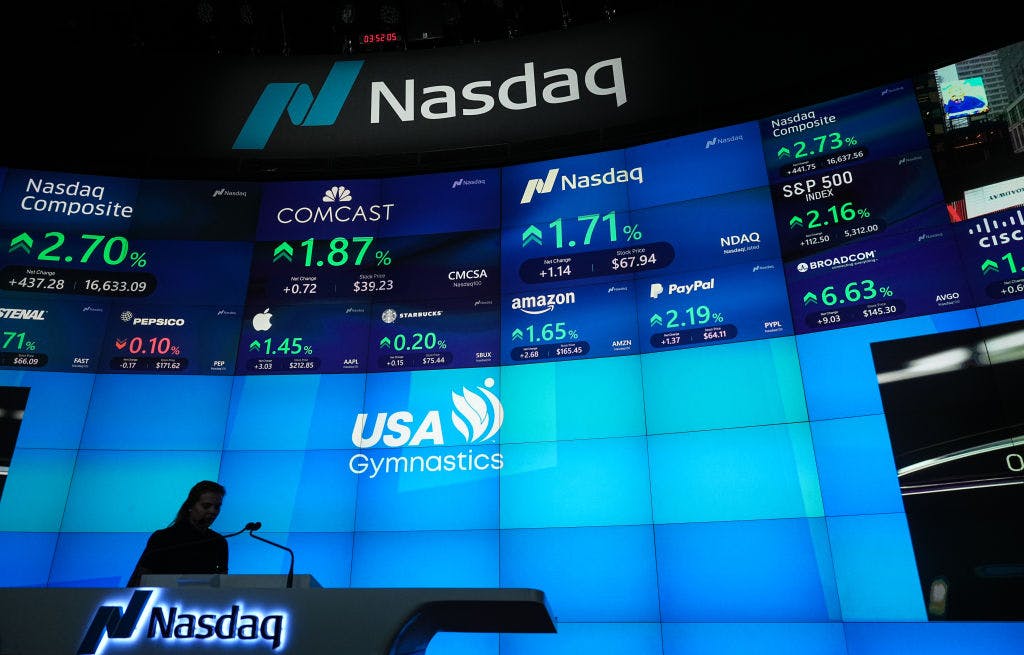Nasdaq is (finally) cracking down on reverse stock splits
Penny stocks' favorite feat of financial engineering is about to get a little bit harder.
Over the last couple of years, you may have seen a stock chart that looks something like this, where the current price is down 90% or more from a peak of more than $1,000 per share.
But this chart is deceiving: Nikola Motors was never worth $1,977 per share. In an effort to stay listed on the Nasdaq, Nikola issued a 1-30 reverse stock split after its stock price collapsed below $1, a practice that has become increasingly popular over the last few years.
For context, stock exchanges like the Nasdaq and the New York Stock Exchange (NYSE) have continued listing standards for companies whose shares trade on their exchanges, and of the main requirements is a share price above $1. When a company’s share price closes below $1 for 30 consecutive trading days, the Nasdaq issues the company a noncompliance warning and gives it 180 days to remedy the situation. However, a delinquent company can request another 180 day grace period when the first period ends, effectively giving it a year to increase its share price. Given that companies can stay listed below $1 for a while, many have, and as of last Thursday, there were 509 stocks listed on US exchanges trading below $1 per share, with 421 of those listed on the Nasdaq. For reference, there were fewer than 12 sub-$1 stocks in the US in early 2021.
Unsurprisingly, companies whose share prices have declined below $1 tend to continue declining, so, to maintain their listings, they have turned to one of the more interesting feats of financial engineering: reverse splits.
Normal stock splits are typically viewed as a positive sign. Companies that have witnessed their share prices climb to the hundreds (or thousands) of dollars often announce stock splits (see Nvidia in 2021 and again in 2024) to maintain a more accessible price.
Reverse splits, however, tend to signal a struggling stock. While General Electric’s stock has done well since its 2021 1-for-8 reverse split, it wasn’t facing delisting warnings, and this move may have been a precursor to the conglomerate’s decision to later split into three separate companies.
A reverse split to avoid delisting usually means the company couldn’t do anything else to keep its stock price above $1. Reverse split volume has continued to increase as more companies’ stock prices slid below $1, with companies carrying out 495 reverse splits in 2023, compared to 102 in 2021.
Last month, electronic trading firm Virtu Financial filed a petition with the SEC asking the Nasdaq to adopt stricter listing requirements:
The bottom line is that current SEC rules that allow high-risk penny stocks to be listed on major stock exchanges present serious investor protection concerns. We believe that it is long past due for the Commission to take a fresh look at its rules around the listing of such securities and ensure that investors are armed with the information they need to assess the investment risks.
One of Virtu’s primary concerns is that the proliferation of reverse splits threatens to confuse retail investors, with the price increases disguising investment risks. It looks like Nasdaq took notice, and last week, The Wall Street Journal reported that Nasdaq had submitted rule changes to accelerate delistings:
Under one of the proposed changes, companies that reach the end of their second 180-day grace period wouldn’t be able to postpone delisting by seeking an appeal. Instead, their shares would move to the over-the-counter market—a sort of purgatory where companies land after being delisted—while they await the appeal. Effectively, the rule change caps the amount of time that sub-$1 stocks can be listed on Nasdaq to roughly a year.
The second proposed rule change would speed up the delisting process for companies that recently did a reverse stock split. Under the change, if a company carried out a reverse split to prop up its share price, but then its stock fell below $1 within a year, Nasdaq would immediately send the company a delisting notice.
This is, to me, a long-overdue change. The idea that a company facing delisting could simply change its stock price without an improvement in the underlying business felt a bit… scummy.
